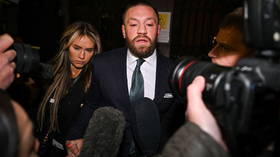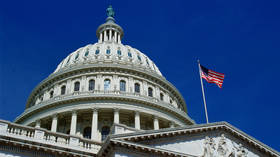How is it ‘problematic’ for Adele to be proud of being a woman?

In a cultural landscape where merely using the wrong pronouns can garner you the ire of outrage mobs, singer and songwriter Adele has angered activists by proclaiming that she is proud to be a woman and female. Now, allegations of transphobia are swirling online, notably from intersectional feminist activists.
And, although one of the more ridiculous examples, this latest ‘controversy’ is yet another reminder of how, ironically, some of the most prominent examples of fourth wave feminism’s personae non grata are women who are merely proud to be female.
On Tuesday, Adele received the Brit Award for Artist of the Year, a new category which combines the previous Best Female and Best Male awards. However, while accepting the honor, despite the accolade’s gender-neutral title, the singer remarked that “I understand why the name of this award has changed but I really love being a woman and being a female artist. I do! I’m really proud of us, I really, really am.”
At this statement of female empowerment, the ceremony’s audience erupted with applause. But predictably, on social media, Adele’s words were picked up by some LGBTQ activists as “transphobic” or “trans-exclusionary.”
Some radical leftists are angry and upset that Adele said she loved being a woman and female artist after winning the top awards at the #Brits Awards show. They think she could be transphobic for the comment. pic.twitter.com/M7qRQtKUXX
— Andy Ngô 🏳️🌈 (@MrAndyNgo) February 9, 2022
The leap from Adele’s words of affirmation to any type of anti-trans bigotry may seem questionable to those lucky enough to be uninitiated into the current realm of progressive politics, but the “problematic” aspect seems to be the singer’s implication that being a woman is somehow tied to the female sex. And while such a concept may have been taken for granted by previous generations, current gender theory posits that gender identity is completely and utterly divorced from biological sex. In this way, a ‘woman’ is now ambiguously and ill-defined as anyone who identifies as a woman. Attempting to tie being biologically female to womanhood, therefore, is seen as implying that trans women are less ‘women’ than cisgender women (i.e. those who are both female and identify as women).
As strange as these attacks on Adele are, they are nothing new to the modern discourse surrounding gender and identity. J.K. Rowling, for example, has infamously lost all media goodwill she once had as a successful female writer by asserting that being biologically female does relate to the experience of being a woman, and by defending women’s rights to female-only spaces, such as prisons.
Adele’s Brit Award statements may have been nothing compared to the explicitly political and pointed posts that Rowling has shared but, nevertheless, this ‘controversy’ highlights how the idea of womanhood being connected to femaleness in any way is increasingly seen as inherently transphobic by LGBTQ activists.
It does not have to be this way, however.
The attempt to separate biology from gender entirely seems to be motivated by the belief that doing so will better protect trans individuals by erasing what distinguishes them from others: that their biological sex and gender identity do not coincide. Hypothetically, if there is no difference whatsoever between a trans woman and a cisgender woman, there would be no grounds to target or marginalize the trans woman. Right?
It may be true that trans individuals face different challenges, both socially and legally, than others, but treating people fairly and with respect should not and does not require us to abandon the notion of biology. Asserting otherwise is akin to saying that in order to stop sexism, we must get rid of the differences between men and women, or that to put a halt to racism, we must pretend that we physically cannot see the difference in skin color between someone of African versus European descent.
It’s also worth noting that trans commentators such as Blaire White and Sarah Higdon openly acknowledge that there is a connection between biology and gender. After all, if there were no link between these two identities, what exactly would make a trans person ‘trans’? What would they be transitioning to or from without the reality of biological sex grounding gender in at least some way?
And despite what progressive activists may say, White and Higdon are certainly not the only ones within the trans community to think like this, and it would be difficult to argue that these individuals are guilty of spreading ‘anti-trans’ beliefs about themselves.
Embracing something about yourself is very different from criticizing an aspect about someone else. Just because Adele may have said that she is proud to be both a woman and female, is that necessarily a slight against those who are women but not female? Or how about individuals who are perhaps neither? Coming from progressives and feminists, who constantly preach self-acceptance and self-love, the idea that someone like Adele should not be proud to be a woman and female is ideologically inconsistent at best.
Finally, what is unusual about the attack on biology coming from the intersectional progressive camp is the fact that, historically, many of the rights that both feminist and LGBTQ activists have fought for were squarely based on biological sex, not gender.
Feminists famously fought for the right to have an abortion, for access to menstrual products, and for policies such as paid maternity leave and universal childcare. Clearly, such issues pertain to the female sex (or menstruators, birthing people and individuals with a cervix, as they are now known in the right-on press). Should feminists continue to support such movements, it will be a tacit admission that yes, the women they claim to be fighting for are, by and large, also female. It’s a similar case for LGBTQ activists, who have focused on same-sex, not same-gender relations.
Separating gender from sex may now by common in progressive circles, but should activists continue to attack well-loved figures like Adele for seemingly innocuous statements, it’s unlikely that they’ll be winning new supporters for their cause.
The statements, views and opinions expressed in this column are solely those of the author and do not necessarily represent those of RT.
















